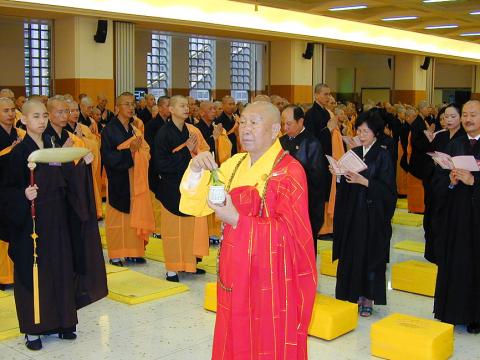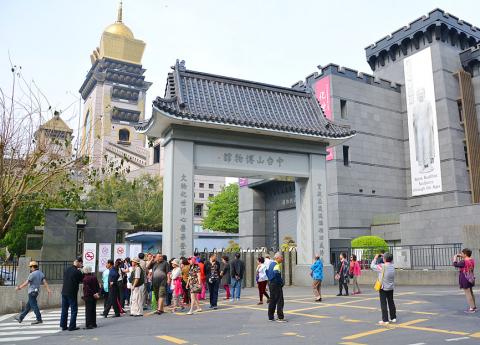Buddhist Grand Master Wei Chueh (惟覺), who founded the Chung Tai Chan Monastery (中台禪寺) in Nantou County’s Puli Township (埔里), passed away at 10:31pm on Friday night, the monastery announced yesterday. He was 88.
The grand master’s death was caused by a regression of marrow regeneration, which resulted in complications, the monastery said.
The monastery was closed yesterday, shutting out buses carrying Chinese tourists.

Photo: Tung Chen-kuo, Taipei Times
It plans to have a scripture reciting assembly from tomorrow until Sunday next week in remembrance of the grand master.
Born in Sichuan, China, in 1928, Wei Chueh was one of the most important religious figures in Taiwan in recent decades, with more than 1,000 monk disciples and hundreds of thousands of followers.
He was credited with preaching Zen Buddhism and reviving Chinese Zen Buddhism.

Photo: CNA
He became a monk in 1963, following Zen master Lin Yuan (靈源) in Keelung’s Shifang Dajue Chan Temple.
Wei Chueh woke at 2am every day when other monks were still asleep to clean up the temple and would salute Buddha at the main hall when other monks were taking noon naps.
He later conducted a retreat in temples in Yilan, Hsinchu and Hong Kong before settling in a cottage in New Taipei City’s Wanli District (萬里).
Firm in belief and living an extremely simple life, he answered the public call to preach and built Lin Chuan Temple beside his cottage in 1987.
His way of preaching was said to be lively and flexible and had no fixed mode.
He used the seven-day Zen retreat and dharma assembly as a way to disseminate Zen teachings, and was said to have contributed to a clean society campaign.
However, due to his growing number of followers, he began to plan the Chung Tai Chan Monastery in Puli, which was inaugurated in 2001.
To nurture the young generation, he also set up an elementary school in 2004, a junior-high school in 2006 and a senior-high school in 2009.
He also constructed the Chung Tai World Museum to showcase Buddhist artifacts and rubbings from inscriptions on stone tablets donated by the Forest of Stone Steles Museum in Xian, China.
Ling Jiou Mountain, another Zen Buddhist society, extended its condolences over Wei Chueh’s death yesterday, saying that the Chung Tai Chan Monastery has contributed to religious exchanges between the two sides of the Taiwan Strait, and helped Chinese access and learn Buddhism.
However, Wei Chueh was not without his critics.
First, some people were not happy with his decision to build the Chung Tai Chan Monastery in a rural area, prompting controversy around land development.
Second, after attending a Buddhism camp at the monastery in 1996, scores of female college students shaved their heads to become nuns. The students’ new looks shocked their parents, with some filing complaints with the Nantou Prosecutors’ Office against Wei Chueh.
However, what was most controversial about him was his political stance.
In contrast with the public perception that a religious figure should keep away from politics, he was a staunch supporter of the Chinese Nationalist Party (KMT) and openly endorsed President Ma Ying-jeou (馬英九) during the 2012 presidential election.
Wei Chueh’s health had deteriorated over the past few months. His last public appearance was on Jan. 17.

The CIA has a message for Chinese government officials worried about their place in Chinese President Xi Jinping’s (習近平) government: Come work with us. The agency released two Mandarin-language videos on social media on Thursday inviting disgruntled officials to contact the CIA. The recruitment videos posted on YouTube and X racked up more than 5 million views combined in their first day. The outreach comes as CIA Director John Ratcliffe has vowed to boost the agency’s use of intelligence from human sources and its focus on China, which has recently targeted US officials with its own espionage operations. The videos are “aimed at

STEADFAST FRIEND: The bills encourage increased Taiwan-US engagement and address China’s distortion of UN Resolution 2758 to isolate Taiwan internationally The Presidential Office yesterday thanked the US House of Representatives for unanimously passing two Taiwan-related bills highlighting its solid support for Taiwan’s democracy and global participation, and for deepening bilateral relations. One of the bills, the Taiwan Assurance Implementation Act, requires the US Department of State to periodically review its guidelines for engagement with Taiwan, and report to the US Congress on the guidelines and plans to lift self-imposed limitations on US-Taiwan engagement. The other bill is the Taiwan International Solidarity Act, which clarifies that UN Resolution 2758 does not address the issue of the representation of Taiwan or its people in

US Indo-Pacific Commander Admiral Samuel Paparo on Friday expressed concern over the rate at which China is diversifying its military exercises, the Financial Times (FT) reported on Saturday. “The rates of change on the depth and breadth of their exercises is the one non-linear effect that I’ve seen in the last year that wakes me up at night or keeps me up at night,” Paparo was quoted by FT as saying while attending the annual Sedona Forum at the McCain Institute in Arizona. Paparo also expressed concern over the speed with which China was expanding its military. While the US

SHIFT: Taiwan’s better-than-expected first-quarter GDP and signs of weakness in the US have driven global capital back to emerging markets, the central bank head said The central bank yesterday blamed market speculation for the steep rise in the local currency, and urged exporters and financial institutions to stay calm and stop panic sell-offs to avoid hurting their own profitability. The nation’s top monetary policymaker said that it would step in, if necessary, to maintain order and stability in the foreign exchange market. The remarks came as the NT dollar yesterday closed up NT$0.919 to NT$30.145 against the US dollar in Taipei trading, after rising as high as NT$29.59 in intraday trading. The local currency has surged 5.85 percent against the greenback over the past two sessions, central